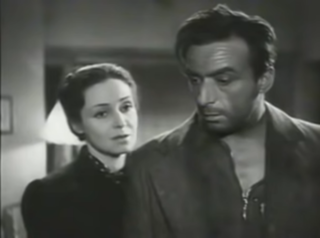
Italian Somaliland was a protectorate and later colony of the Kingdom of Italy in present-day Somalia. Ruled in the 19th century by the Somali Sultanates of Hobyo and Majeerteen in the north, and in the south by political entities such as the Hiraab Imamate and Geledi Sultanate.

Telefoni Bianchi films, also called deco films, were made by the Italian film industry in the 1930s and the 1940s in imitation of American comedies of the time in a sharp contrast to the other important style of the era, calligrafismo, which was highly artistic. The cinema of Telefoni Bianchi was born from the success of the Italian film comedy of the early 1930s; it was a lighter version, cleansed of any intellectualism or veiled social criticism.

The cinema of Somalia refers to the film industry in Somalia. The earliest forms of public film display in the country were Italian newsreels of key events during the colonial period. In 1937 the film Sentinels of Bronze was produced in Ogaden Somalia, with nearly all Somali actors. Growing out of the Somali people's rich storytelling tradition, the first few feature-length Somali films and cinematic festivals emerged in the early 1960s, immediately after independence. Following the creation of the Somali Film Agency (SFA) regulatory body in 1975, the local film scene began to expand rapidly. In the 1970s and early 1980s, popular musicals known as riwaayado were the main driving force behind the Somali movie industry. Epic and period films as well as international co-productions followed suit, facilitated by the proliferation of video technology and national television networks. In the 1990s and 2000s, a new wave of more entertainment-oriented movies emerged. Referred to as Somaliwood, this upstart, youth-based cinematic movement has energized the Somali film industry and in the process introduced innovative storylines, marketing strategies and production techniques.

The Trust Territory of Somaliland, officially the "Trust Territory of Somaliland under Italian administration", was a United Nations Trust Territory situated in present-day Somalia. Its capital was Mogadishu and was administered by Italy from 1950 to 1960, following the dissolution of the former British Military Administration. It gained independence in 1960.

Amedeo Nazzari was an Italian actor. Nazzari was one of the leading figures of Italian classic cinema, often considered a local variant of the Australian–American star Errol Flynn. Although he emerged as a star during the Fascist era, Nazzari's popularity continued well into the post-war years.

Fosco Giachetti was an Italian actor.

The Djiboutians are the people inhabiting or originating from Djibouti. The country is mainly composed of two ethnic groups, the Somali and the Afar. It has many languages - though Somali and Afar are the most widely spoken ones, Arabic and French serve as the official languages. There is a small Djiboutian diaspora in North America, Europe, and Australia.

L'abito nero da sposa is a 1945 Italian historical drama film directed by Luigi Zampa and starring Fosco Giachetti. It is based on the play The Cardinal by Louis N. Parker.

Giovanni Grasso was an Italian stage and film actor. He appeared in more than 80 films between 1910 and 1955. He was born and died in Catania, Sicily, Italy. Born into a family of marionettists, he was cousin and namesake of Giovanni Grasso, a respected stage actor specialized in the Sicilian language repertoire, so he assumed at the beginning of his career the stage name "Giovanni Grasso Junior" to stand out. He was mainly active on stage, often acting together with his wife, Virginia Balestrieri.

Italian Somalis are Somali-born citizens who are fully or partially of Italian descent, whose ancestors were Italians who emigrated to Somalia during the Italian diaspora, or Italian-born people in Somalia. Most of the Italians moved to Somalia during the Italian colonial period.

Doris Duranti was an Italian film actress. She appeared in 43 films between 1935 and 1975. She had a years-long affair with Alessandro Pavolini, a Fascist politician who in 1945 was executed by Italian partisans; his body was then hung with that of Benito Mussolini.

Fugitive in Trieste is a 1951 Italian war-drama film directed by Guido Salvini and starring Doris Duranti, Jacques Sernas and Massimo Girotti.

Bengasi is a 1942 Italian war film directed by Augusto Genina and starring Fosco Giachetti, Maria von Tasnady and Amedeo Nazzari. The film was shot at Cinecittà in Rome. The film was a propaganda work, designed to support the Fascist regime of Benito Mussolini. It portrays Allied atrocities in "Bengasi Italiana", such as the murder of a peasant by a group of drunken Australian soldiers.

We the Living is a two-part 1942 Italian romantic war drama film, based on Ayn Rand's 1936 novel of the same name. It was originally released as two films, Noi vivi and Addio Kira. It was directed by Goffredo Alessandrini and produced by Scalera Film, and stars Alida Valli as Kira Argounova, Rossano Brazzi as Leo Kovalensky, and Fosco Giachetti as Andrei Taganov.

Aldebaran is a 1935 Italian drama film directed by Alessandro Blasetti and starring Gino Cervi, Evi Maltagliati and Gianfranco Giachetti. The film was a naval melodrama, an attempt by Blasetti to make a more commercial film following the difficulties encountered with the propagandist The Old Guard (1934).

The Great Appeal is a 1936 Italian war film directed by Mario Camerini and starring Camillo Pilotto, Roberto Villa and Lina d'Acosta. It is sometimes known by the alternative title The Last Roll-Call.

Under the Southern Cross is a 1938 Italian drama film directed by Guido Brignone and starring Antonio Centa, Doris Duranti and Enrico Glori. The film is set in Italian-occupied Abyssinia following the recent Italian victory there. It was one of a sequence of eight films set in Italy's African Empire during the Fascist era that were released between 1936 and 1939. The film is a propaganda piece designed to support Fascist policy on empire and concerns about inter-racial romances.

The Daughter of the Green Pirate is a 1940 Italian adventure film directed by Enrico Guazzoni and starring Doris Duranti, Fosco Giachetti and Camillo Pilotto. It was shot partly at the Pisorno Studios in Tirrenia with sets designed by the art director Piero Filippone. The film was based on a novel by Emilio Salgari.
Reer Faqay, also known as Banu Qahtan, is a Somali clan and a Benadiri sub clan. It is primarily found in the southern coastal cities of Mogadishu, Marka, Baraawe and Kismayo. They established communities in the hinterlands in towns such as Afgooye, Baidoa, Diinsoor and Bardheere.
The Mohamoud Garad is a Somali clan. Its members form a part of the Dhulbahante, a sub-division of the Harti/Darod clan-family. The clan is divided into three main sub-clans ― namely the Jama Siad, the Ugaadhyahan and Omar Wa’eys.



















